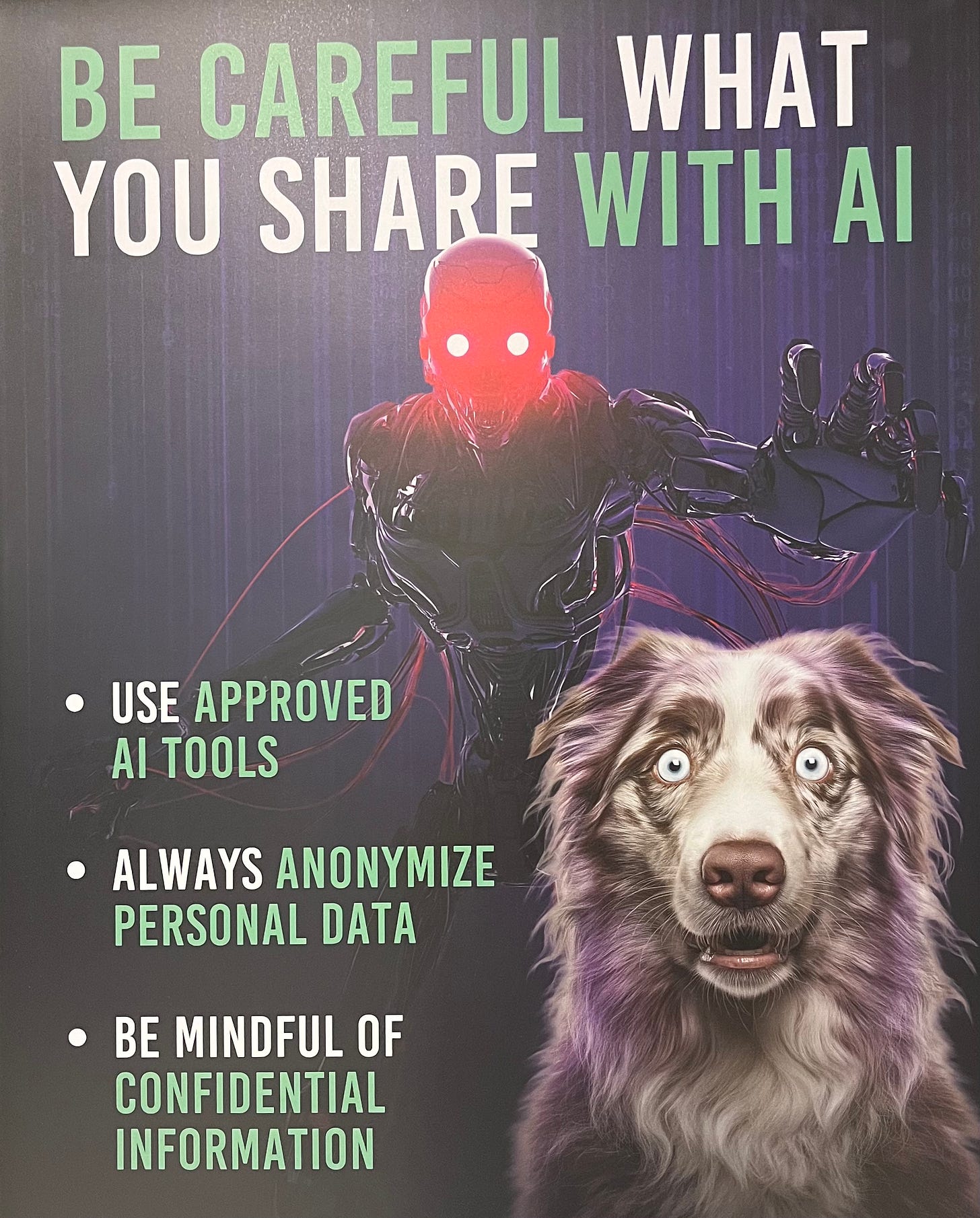The 5 principles of using AI professionally
Navigating the workday in the crazy age of AI.
Last week my dad dropped by our office in Amsterdam for a cup of coffee. We were standing in the marketing department and I happened to show him our new humorous AI safety warning posters. This instantly triggered a response from him: “This AI stuff is driving me mad, people send me AI summaries based on dictation and it’s just bad.”
Clearly, the proliferation of AI is affecting every business - bricks & mortar as well as digital. AI tools such as ChatGPT provide a new way of manipulating human knowledge and communication. I love AI and am a builder of AI, but I share my dad’s frustration of AI “getting in the way”. Just yesterday I joined a video call where most of the participants were AI note takers.
How do we navigate this crazy new world? What are some principles that help us stay grounded as gentlemen of the AI revolution? And perhaps more deeply, how can AI make us more human and not less?
Principle 1: Value Human Thought
Modern AI - and more specifically Large Language Models (LLMs) - are tools for manipulating human knowledge. An LLM can be thought of as a very sophisticated autocomplete search engine. The better your input prompt, the more relevant your results. The strength of the input signal determines the uniqueness of the output.
Another way of saying that is: Garbage in = garbage out.
You would think that providing the LLM with a very large prompt, for example by dictation, would allow it to create better results. This is not the case. Even with advanced LLMs (that have large context windows) the model does not understand which information is actually important.
LLMs can be a great tool for refining existing ideas and expanding research. For original thought however, they can distort the thinking process. You’d be better off embracing pure human thought and creating technology-free thinking moments and spaces.
AI-free zones may be absolutely necessary to safeguard our actual minds. Recent studies of the brain show that use of LLM (ChatGPT) is severely impacting our cognitive abilities.
Principle 2: Respect Human Attention
Did you actually read the full output produced by the LLM? Did you critically evaluate whether the output is good? If you did neither of these, then you have no business sharing this with someone.
Your time is valuable, but the other person’s time is also valuable. In a world dominated by verbose machines, the value of human attention only goes up.
Perhaps in the future we will use LLMs to summarize all information we consume. But in any scenario, the signal and unique thoughts that are captured in the text are what matters. Respect human attention.
Principle 3: Be Transparent
We encourage all our staff to use AI in their work and gladly pay for the tools (but no yearly plans in this quick shifting landscape!). LLMs at a minimum help in knowledge acquisition, smoothing out communication, data manipulation and many other areas.
There are many wasteful processes that are eliminated by AI. We should celebrate that. But if AI makes you superhuman, don’t take credit for its work. As I tell my kids: Don’t use ChatGPT to do the homework, use it to improve yourself.
I think it’s good practice to place a little disclaimer note on any documentation or communication produced by AI. This will make it easier for others to assess the value of the output and spend their attention wisely. Here are some examples:
AI Note: This is a generated proposal based on a couple of bullet points.
AI Note: This is a translation from a draft article in Dutch
AI Note: Used ChatGPT to correct some phrasing/grammar.
AI Note: This from a Fireflies AI summary based on a call. Very raw.
AI Note: Used Claude to expand the core idea.
AI Note: Used GPT deep research to look at some of our competitors.
Principle 4: Care for your Customers
If you deal with customer data you probably have processes in place already for data custody. AI tools are no different than any other SaaS product, however due to the emphasis on information manipulation there is an extra degree of care and awareness needed to respect customer and confidential data.
Customer support probably has the biggest near term impact by AI. When deploying AI tools, it’s important to increase our focus on the customer experience. Our team at Road has done great work in AI support automation - being featured as an Intercom AI case study. It’s amazing to see the AI resolution numbers go up every month, but I know the team’s primary focus are the metrics that matter: customer satisfaction.
Principle 5: These are just Tools
Do you really need an AI notetaker on this intimate video call? Does anyone actually read your AI summaries? Are you still using that generative AI extension you pay for?
The landscape of AI tools is exploding. Every piece of software you use will have LLMs built into it. Chat interactions are evolving to smart workflows, copilots, agents, virtual assistants, etc. We will have increasingly powerful tools, but let’s not forget: they are just tools.
AI is not magic, they are tools created by us humans that can make our lives easier (and sometimes a little harder).
—
Remember that in a world filled with AI there will be a premium value on human thought, attention, integrity, empathy and ingenuity.


